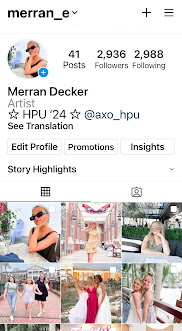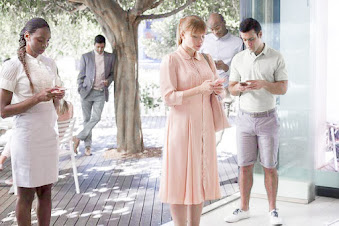The Online Influencers: Phenomenon and Implications
As a hobby, I'm an Instagram micro-influencer. To answer your questions: No, my eyes aren't glued to my phone 24/7 and I don't really eat avocado toast. What I love is designing my own filters on Lightroom, curating an artistic grid, and engaging with my online community-based in Texas and North Carolina. Nonetheless, it also can be incredibly frustrating. In this post, I hope to explain a bit more about the phenomenon of online influencers, and what their resultant implications might have on society.
In recent years, society has seen an unprecedented shift from celebrities to social media influencers taking center stage as swaying the opinions, buyer preferences, and overall views of consumers. Influencers now more than ever are setting the trends, especially for today's tech-savvy teens that are less interested in traditional TV as opposed to older generations. In addition, millennials and get-Zers alike often find themselves more easily relate to the lives of influencers who they perceive as more realistic and down to earth in comparison to their glitzy celebrity counterparts.
Influencers have the power to affect the purchasing decisions of others because of his or her authority, knowledge, position, or unique relationship with their audience. They have a hefty following in a distinct niche with whom they actively engage and the size of the following depends on the topic of the niche. On Instagram, examples of popular niches for influencers include fashion, food, lifestyle, and travel. When in partnership with brands, subtle and not-so-subtle product placement is often utilized as a part of profitable financial partnerships. However, influencers are not merely marketing tools but also social relationship assets with which brands can collaborate to collectively achieve marketing goals. In a social media setting, influencers have a strong, regular presence on their preferred platform and often model a particular and distinct personal "brand" that sets them apart from others. Popular platforms often include Instagram, Youtube, and in more recent years, TikTok.
As idyllic and candid as online influencers may seem to appear, this new phenomenon is perpetuating unrealistic standards for the definition of a happy, successful, and fulfilled life. In terms of demographics, around 86% of 18-29-year-olds use social media and around 65% of those respondents are female. Also, from 2009 to 2017, when popularized social media was largely gaining traction, the rate of adolescents aged 18 to 25 reporting symptoms of major depression had increased by 63%. These statistics are highly alarming, yet I understand them well, having dealt with anxiety and depression myself only a few years prior when I first began developing my Instagram platform. It's important to keep in mind that social media is a game of "smoke and mirrors" that only displays a polished and perfected highlight reel rather than what really goes on behind the scenes. If one can first approach time spent on social media with a designated purpose in mind and can walk away after that task has been accomplished, then it is often far easier to develop a healthy mindset towards social media and overcome its often harmful effects.A new term that has been coined in recent years to refer to prominent social media accounts that garner anywhere between 2,000 to 1,000,000 followers is the Instagram "micro-influencer", and I as well as many of my close friends are considered to fall under this category. There are seemingly countless positives and negatives when it comes to the micro-influencer phenomenon, but the biggest effects seem to be an increase in comparison between others as well as a heightened awareness of digital security. From personal experience, I know that after one "breaks 1,000", or can draw in over 1,000 followers to their account, there is typically a sudden influx of DMs from potential brands interested in partnerships. Yet, as enticing as this may sound, Instagram collab scams have been increasingly preying on micro-influencers in alarming numbers over the past few years and endangers the digital safety and privacy of online users, especially vulnerable young females in my generation. Just a few telltale signs of these schemes include DM or photo comments such as "Hi lovely, we ADORE your gorgeous feed" and "DM to collab! (followed by emojis)". Especially for young women, if a "brand" reaching out utilizes sexist or cutesy language, vague descriptions, and one would be expected to buy products without being paid for work, then the offer is likely a scam.






Comments
Post a Comment